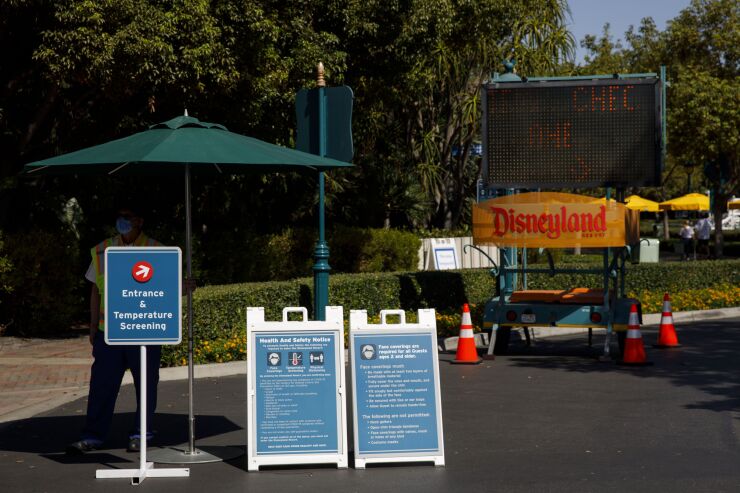The city of Anaheim, home to Disneyland, received its second rating downgrade the same day that the California governor announced that parks, sports stadiums and theme parks could welcome back visitors on April 1.
Speaking to the April 1 opening day for Major League Baseball, Newsom said he is confident “if we do our jobs, if we don’t let our guard down and spike the ball — wrong sport — then I have all the confidence in the world that fans will be back safely.”
Anaheim had its issuer default rating downgraded to A-plus from AA-plus by Fitch Ratings Friday. The rating agency also lowered the ratings on several series of revenue bonds issued for the city's convention center, citing elevated expenditure pressures and weakened operating performance as a result of the pandemic.
“The sudden and deep revenue reductions make sufficient spending cuts to balance the budget impractical,” Fitch analysts wrote, adding it expects “spending levels to be above revenues for the foreseeable future.”

Ongoing budget adjustments will be needed to realign spending to revenues and replenish reserves, Fitch wrote.
The Anaheim Public Finance Authority’s series 2019A lease revenue bonds and Series 1997A were downgraded to A-minus from AA-minus and its 2014 series that funded a convention center expansion fell to A from AA.
Fitch pointed to the uncertainty surrounding the longevity of restrictions on Disneyland as it revised the outlook on the 1997 and 2019 LRBs to negative from stable. It also affirmed a negative outlook for the issuer rating and series 2014A lease revenue bonds.
The continued closure of Disneyland was also cited by Moody's Investors Service when it downgraded the city's issuer rating to A1 from Aa1 in February and changed its outlook to negative from stable. The closure of the amusement park, a major economic driver for the city, weakened its revenues, Moody's said, as it also downgraded the rating on $196.4 million in senior lease revenue bonds to A2 from A1.
Restrictions on travel and tourism have resulted in a steep decline in hotel bed taxes and sales tax resulting in a $114 million deficit for fiscal 2020-21 that, if realized, would deplete the city’s general fund reserve, Moody’s wrote. Nearly half of the city’s general fund revenue comes from bed taxes and sales tax, according to the rating agency.
Disneyland Resort President Ken Potrock said in a statement he is “encouraged that theme parks now have a path toward reopening this spring, getting thousands of people back to work and greatly helping neighboring businesses and our entire community.”
Amusements parks will be able to reopen in counties in the red tier, the second strictest of the
Parks in Los Angeles and Orange County including Disneyland, Knotts Berry Farm and Universal Studios have been closed since the governor announced shut downs a year ago. Both counties are currently in the strictest purple tier, but Newsom said that cases are expected to decline, allowing the counties to enter the red tier by April 1.
The capacity, or number of guests, the parks and stadiums will be allowed to usher in, will depend on each county's COVID-19 positivity rate.
Capacity will be limited to 15% for parks in counties that are in the red tier; the cap rises to 25% once a county progresses to orange and 35% upon reaching the most lenient tier, yellow.
Attendance will be limited to in-state visitors and indoor dining and indoor rides will be restricted.





